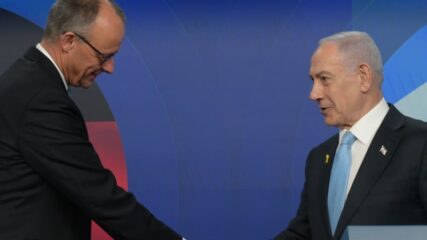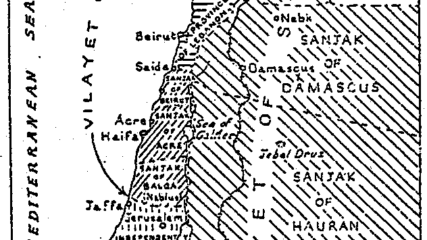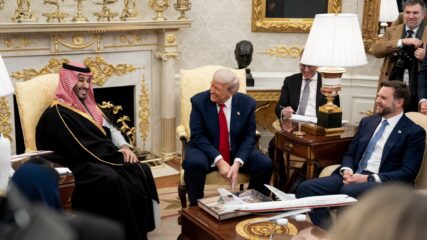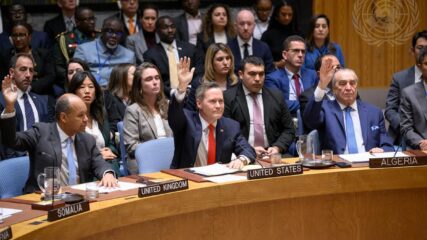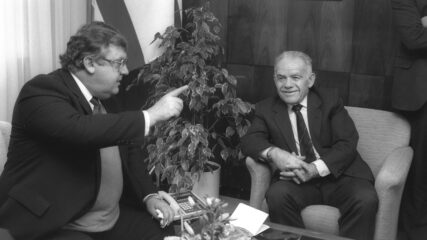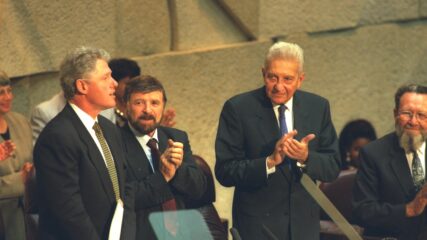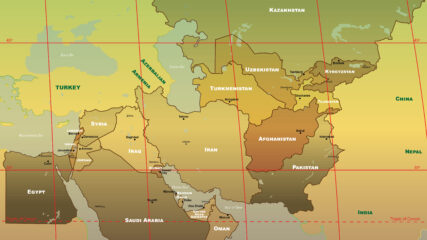1952
Updated July 31, 2025
Excerpt from Sefer Hapalmach, Israel: United Kibbutz, Israel, 1952-3, Vol. 2, pp. 430-436. Translated by Roni Eshel and condensed and edited for use here by Ken Stein. [1]
Born in the Lower Galilee in 1918, Yigal Allon commanded the Palmach, which was the elite strike force of the Haganah, one of the Jewish defense force organizations formed in Israel pre-state period. He served as interim Prime Minister for three weeks in 1969 and later in multiple ministerial capacities. Before the May 1948, Independence War, the Palmach facilitated illegal immigration of Jewish refugees into Palestine, after the British White Paper of 1939 severely limited legal immigration. He also led operations against the British aiming to hasten their departure as Palestine’s administrator. After the UN Partition decision in November 1947, the Palmach defended Jewish settlements from Arab forces. In this assessment, Allon refers back to these activities as greatly helping Israel’s success in the war, explaining that these previous experiences “provided the Israeli fighters with the opportunity to act and respond under real fire.” Allon’s review of the war is analytical, succinct, and crisp.
Additionally, he explains that for the Jews, this war was one of “existence and liberty – a war of no-alternative and of last resort fully aware of the dire consequences if it failed, and confident about the justifications of its aims.” Allon attributes Israel’s success to its organization and centralized command, familiarity with the territory, “versatile and original approaches,” and strategic locations of kibbutzim and other settlements. He gives high value to Israeli fighter steadfastness to a particular place as reason for holding on to territory. Likewise, he attributes the readiness of Arab populations to flee quickly, often at the request of their leaders to get out of the way of incoming Arab armies, as a major reason for the Israel’s military advances. Derived from the 1948 Independence war, Israel evolved foundational values undergirding its Israel’s national security doctrine: perseverance and adaptability to defend the land.
— Maya Rezak and Ken Stein, July 18, 2025
Because of security considerations time is not ripe to have a comprehensive and public analysis of the lessons from the {Independence] war. But it would be proper to relate to some milestones that illuminate and explain the main reasons for our victory, including the weaknesses of the enemy. Though there are differences between the Arab armies that fought against us some weaknesses are common to all of them. The following are the major observations and lessons:
A. The war of the Arab countries against Israel was one that the Arab rulers forced upon their own people. It was not an organic need of those countries. It was not launched for their survival, or liberty. This affected the resilience of our enemy while the Jewish Yishuv fought for its existence and liberty – a war of no-alternative and of last resort fully aware of the dire consequences if it failed, and confident about the justifications of its aims.
B. The Arab armies lacked a centralized command such as supreme military authority for the coordination of all fronts. The Arab governments were divided and followed their own traditional preferences and their own specific national interests. This divisive stand was reinforced by the fact that each country had its own internal conflicts. This contributed to their lack of mutual assistance, coordination and the exploitation of our own weakness in the [military] fronts. These factors enabled us to be more effective when we were ready to launch our offensives against them. We, on the hand maintained a united fighting capability. All of our people and armed forces were operating under a unified command.
C. The enemy did not utilize the full potential of its man-power. In reality, the countries recruited small armies compared to their respective populations, though superior in their numbers compared to ours it did not assist them in achieving a decisive advantage over us.
Their performance can be discerned from the following facts: The general backwards conditions that characterized the feudal regimes of the Arab countries; the inattentive attitudes of the rulers to the conditions of their people; their fear of [domestic] uprisings and other expressions of discontent forced them to use their armies for the protection of their regimes without trained reserve units who might have turned against them. The Israelis fully utilized its manpower and the ratio of armed forces vis-à-vis the general population stood in our favor.
D. The low literacy rate of the Arab populations limited the capabilities of the armies of our enemies. The organization of a modern military is a complicated enterprise. Understanding the principles of war, the knowledge and the proficient use of new technical devices requires high technological and cultural skills.
E. Though they lacked those skills they did reach a relatively high standard of operational skill. As opposed to them the Israeli soldiers had an intellectual edge that enabled them to be efficient and utilized the utmost of our limited arsenal and reach high tactical competence.
F. The Arab armies studied the structure and tactics of European armies and copied them without altering them to their specific needs. The European models evolved did not fit the special economic and social circumstances of under-developed nations. Here is probably why the Arab armies deployed tactics and war maneuvers that were quite rudimentary and appeared as if taken indiscriminately from a textbook.
They have totally neglected the use of commando operations which fitted very well the character and the capabilities of the Arabs and could have been an adequate method of fighting us considering the country’s terrain and battlefields.
Our commanders benefited from their studies of foreign armies but remained faithful to their original approach of exploiting our specific needs and circumstances and applying them to our military operations. Our flexibility was no doubt a major contributory factor that paved the road to our successes. This approach encouraged, – both in large and small military units that deployed conventional fighting or guerilla warfare – the swift adaptation to the changing circumstances of the battles.
Whether during the day time or in night fighting our versatile and original approaches enabled us to surprise the enemy and defeat him without having the quantitative advantage or superior arsenal. As it is well known the surprise is one of the foremost principles in a war.
It is true that there were small and large units in the Israeli Defense Forces (IDF) that emulated the methods of foreign armies and specially those of the British military with regards to discipline, education and methods of training and fighting. But it soon became apparent that those units, despite their qualitative manpower lagged behind other units in their cohesiveness, fighting spirit and fighting skills. Luckily, all the Palmach brigades and most of the field units of the IDF remained loyal to the original fighting and social principles of the Haganah and they were the ones that tilted the scales in our favor.
G. In addition to our training methods and tactical concepts that were practiced in the majority of our units, we also enjoyed the advantage of our prior military experience.
A significant number of the Israeli soldiers experienced fighting Arab gangs and confronting Arab riots while serving in guarding and security units. Some of the Jewish military brigades served with the British army and many Israeli fighters later used their trainings to fight in land and in sea against the British forces during the Mandatory period.
In addition, all the Haganah units and primarily the Palmach acquired military experience in the early stages of the War of Independence fighting against the local Arabs and the Arab “volunteers” who arrived from neighboring Arab countries before the invasion of the Arab armies into Israel. Though these were not sufficient experiences, they nevertheless provided the Israeli fighters with the opportunity to act and respond under real fire.
Most of the invading armies lacked military experience, though they were well trained in simple fashions. Indeed, the Trans Jordan Legion had gained some experience in suppressing the Rashid Ali coup d’état in Iraq in 1940 and also in the British offensive in Syria in 1941, but it was a limited military experience.
H. The invading armies underestimated the fighting capabilities of the local Arabs. This attitude precluded from the circle of war thousands of potential recruits who knew the country well and could have been useful as guerilla fighters against the Israel. This not only limited the scope of the Arab countries armed forces, but also left many locals with no prescribed assignments that would have contributed to the war effort. In addition, it prevented the local Arabs to effectively defend their villages. This contributed to the potentially growing numbers of those who would enter refugees’ camps, since an unorganized population would tend to panic and runaway, in the face of the failures of the armies that were supposed to defend them. Such was the case in the war against us.
[By contrast} The Haganah was able to have the majority of the Jewish population join the war effort. It manifested itself in organizing all the Israeli towns, villages and kibbutzim with resistance capabilities and it was evident on the pioneering settlements both in the front lines and inside the country. As such all the Israeli regions functioned as a network of small fortresses that made up the fundamental structure of the defense of the country.This organizational method integrated the majority of the citizens into actively participate in the war effort. It also enabled the fighting brigades that were deployed along the country’s fronts to concentrate in offensive operations against the invading armies, knowing that the defense efforts inside the country were appropriately organized.
This does not imply that all went well. In reality the burdens were not equally distributed. The general industry of the country was not fully geared for the war needs. There were also those who personally benefitted by exploiting the shortage of materials. Other problems stemmed from lack of efficiency in some political and public organizations.
There was also a backlog in the recruitment process of manpower but overall, the organization of the Israeli public was by far superior to that of the enemy and was a cardinal factor in our victory.
I. The decision of the Arab leadership at the onset of the war to evacuate the local Arab population from locations mixed with Israeli population was wrong and stemmed from two faulty assessments: First, it prevented the Israelis and the Arabs in those areas to maintain proper relations and second, they thought that by “cleansing” those areas of the Arab population it would allow them to attack and conquer the remaining Israel population.
This strategy proved to be detrimental from military, as well as political perspectives. Despite the initial planned evacuation processes the local Arab population became fearful and the evacuations turned into a massive flight that obstructed the war efforts of the Arabs. It blocked major transportation arteries while fierce battles were raging and it caused demoralization within the entire Arab population of the country.
These factors eased the tasks of the Haganah and later of the IDF to conquer and capture the evacuated areas where the local Arab population presented direct danger. Contrary to the Arabs, when Israeli population was forced to evacuate their homes in extreme instances it was done on a small scale and applied only to the elderly, the children and some of the women. Such policy strengthened the trust of the general public in our defense forces and contributed to the unification of the entire population.
J. The intelligence services of the Arabs had many substantial failures. Not so much about the quality of information regarding the numbers of our forces, but in assessing the military and psychological qualities and strengths of our soldiers.
Consequently, the enemy misjudged our capabilities, underestimated the planning of our military operations and exposed loopholes and weaknesses in their own deployments. The invading armies created illusions in their soldiers that the battles will be brief and decisive in their favor, thus it decreased their efforts and incentives.
As a result, the enemy was not prepared to face stubborn resistance or lengthy and bloody battles. No wonder that when truth surfaced the entire Arab public and its military forces were disillusioned and hope and enthusiasm were replaced by despair and depression.
Such shift in moods is like half way to defeat from a military standing point: lack of precise intelligence or wrongly evaluating it can lead to arrogance and an underestimation of the opponents and both are equally dangerous. Our enemy was wrong on those two counts by allowing imagination and fantasies to overshadow a healthy sense of realism.
Our military intelligence not only collected multitude of facts but was also capable and skilled to arrive at accurate assessments about our enemies’ intentions, strengths and weaknesses. Many of our commanders had made good use of the information and also increased the efficiency of their own intelligence and reconnaissance units. As it turned out the competence of our intelligence services was one of the major contributory factors to the planning and the execution of most of our operations.
K. Another weakness of our enemy stemmed from its military organization and customs. The feudal structure and hierarchy that existed in the Arab social system was also practiced in the military.
The ruling strata in the economic and the civil governmental and public institutions were composed of the officers’ corps in the military regardless of their qualifications. The supposed civilian lower classes – tenants and laborers – were the regular soldiers. The distance between the ordinary soldiers and their commanders with regards to daily routines, standard of living, carrying the actual burdens and exposure to eminent dangers was very wide. Most officers had very small regard for their soldiers and they in return hated and despised their officers. This led a wide gap and distrust which was common in many units. It also affected the cohesiveness of the armed forces which is essential for success. Such was not the case in our armed forces. In almost all of our units there was a sense of camaraderie between soldiers and their commanders, there were no class differentiations and friendly relations existed among all warriors regardless of their ranks.
All these factors contributed to the unity and the cohesiveness of the [Israeli] fighters and increased the efficient operations of their units. All these did not infringe on the importance of discipline. In reality it enhanced it because it was recognized by all that military formalities and status are only secondary to the basic commitment to the larger cause of fighting for one’s own country and values.
L. The Israeli commander, especially of the low and intermediate ranks is by far more superior to the Arab commander. He is both a combat leader and an educator. Anyone who understands the importance of the person who directly impacts the soldiers and is responsible for the execution of effective battle management will easily understand that the qualities of the commander are the major leverage in attaining victory.
M. While the invading Arab armies were foreigners and regarded the local Arabs as inferior whom they were supposed to lead into victory, the Israeli fighters were made of different mold. The majority of the Israeli soldiers regardless of their ranks was well acquainted with the land, knew the terrain and used the topography of the country in shaping the attainment of the final victory.
N. The settlement strategy of the country was the strong foundation upon which the defense premises were based upon. During the 15 years prior to the War of Independence, the organizations that were in charge of the settlement enterprise were guided by the Haganah in applying settlement strategy that took into consideration not only the specific security requirements of individual settlements but also in developing an overall defense guidelines for the whole country – not yet an independent state.
The establishment of new pioneering settlements, especially kibbutzim inside a predominantly Arab populated regions required the planning of their defense both in times of peace and of war. And when the war broke out those settlements were effective in preventing the enemy’s advances and served as launching pads for some of our military offensives.
In addition, the settlements that were established along transportation arteries that connected Arab regions and neighboring Arab countries gave us the opportunity to cut those roads in the early stages of the war and stop the invading convoys prior to entering the country. Unfortunately, we did not have enough settlements along those arteries and it was difficult for the IDF to prevent them from penetrating our borders in some crucial instances.
The active participation of the settlers in the defense systems of the country not only saved manpower but also provided the IDF with the capability to initiate and launch series of offensives. The settlers’ participation in the defense of the country eased the economic burden on the military and set inspiring examples of tenacity and perseverance for our forces.
The strategy of creating Israeli settlements as “circular defenses” around Arab towns and villages in the country was in retrospect crucial since it determined the future of those Arab population centers. That strategy enabled the IDF to capture such towns as Tiberia, Haifa, Acre Nazareth and many others. The Arab population centers that were not encircled by Israeli settlements made the battles of overtaking them much more difficult and costly.
It is easy to speculate nowadays (1950-52) what would have been the fate and the status of the Old City of Jerusalem if the Zionist Movement had the ample time to solidify the Israeli pioneering settlements around that city.
O. The wise war strategy of the Haganah and later on of the IDF – though it was not void of mistakes and failures – served as a decisive factor in the attainment of our victory. This strategy was employed in the form of active defense during the British Rule of the country, allowing the British with the opportunity to depart our country as scheduled without giving them the opportunity to postpone or cancel their departure.
During the years leading to their departure the time was used for acquiring and purchasing essential military equipment and to organize and train our forces. This strategy manifested itself in acquiring more territories before the British departure, to minimize the security dangers long our main transportation arteries and deploys our armed forces before the expected invasion of Arabs armies. When the opportunity first presented itself it provided us with an ample time to switch from active defense into a universal offensive mode. This flexibility saved the Negev, the Western Galilee and the majority of the Upper Galilee because we were able not to resort to the evacuation of our settlements in those areas, but rather using them actively as part of our defensive and offensive strategies. Though we made some mistakes in the management and the execution of the war our main failure was in stopping some our offensives prematurely, and in not initiating additional and crucial military operations.
This was especially true with regard to the final stage of the war when we had the opportunity to annihilate our enemies, earn the right to Greater Israel and still be able to reach a lasting peace under cease-fire agreements. All these were within the reach of the IDF at the time.
P. The subjects that we have detailed in the previous section (N) and were among the factors that led to our victory; [They] stemmed from the existence of the Haganah and its various branches prior to the establishment of the State and later as it was manifested in the IDF. For many decades (prior to 1948) the thousands members of the Haganah, its local branches, its armies and brigade, its Central Command and the hundreds who were trained as commanders, the fighting settlements, the arms that it acquired in covert operations while still acting as an underground organization, its ideology and its military tradition, all derived from the volunteering spirit and the initiatives of generations of pioneers that helped shape the victory that altered our history.
Q. No miracle had occurred during the War of Independence. All those who are familiar with the scope of the sacrifices and the burden of the extreme efforts, cannot attribute the victory to an abstract definition of miracles.
All that has been achieved can be explained logically and scientifically. If indeed a miracle had happened, then there is only a single one: Regarding miracles as heresy. That “heresy” led to creation of the Haganah, and later the Palmach (Striking Forces) in time to be ready to achieve the country’s historic victory.
If the Haganah had exhausted the full potential of the Jewish People and of the Yishuv, the enemy would have encountered a much stronger and fiercer opposition. But the Haganah should be credited with the fact that it used efficiently its limited resources that were allotted to her by the Jewish Agency and other public institutions.
It can be firmly stated that though the Haganah was only a paramilitary organization subjected to the authority of a “pre state” quasi Israeli government, not only fulfilled its military objectives but also carried the banner of a national liberation movement.
R. All the factors that have been mentioned formed the advantage that brought us the decisive victory. The fact that stands out is that we had a qualitative rather than a quantitative advantage as opposed the enemy’s capability to amass large physical forces. It is only reasonable to assert that the main lesson from the war is that the leadership of the Haganah envisioned the inevitable confrontation long before it had actually happened.
As the war was about to end, cease-fire agreements were reached between Israel and its enemies (that in actuality was one and unified enemy) in their desire to uproot Israel and have her vanish from the world at the time of its birth. There is no doubt that our leaders were guided by many political considerations when it decided to halt the advances of our military and agree to enter into cease-fire negotiations as a mean to achieve peace with our Neighboring Arab countries.
It is clear that major diplomatic difficulties caused our government to retreat from fighting for the greater Israel and widen the current no-borders borders and allow the enemy to maintain military bases within the borders of Eretz Israel. But the consequences of those political and diplomatic considerations placed Israel in apparent and permanent dangers.
All too often one might worry whether “we won the battle and lost the peace”. But in the end we should appreciate what we currently have and be adequately prepared for the future.
[1] Yigal Allon was born in Kfar Tabor, Palestine in 1918. In 1941 he was among the founders of the Palmach and commanded it from 1945-1948. Both Yitzhak Rabin and Moshe Dayan served under his command in the Haganah during the Independence War. Allon was elected to the Knesset in 1954 and served as MK until his death in 1980. He served in many ministerial posts including for a brief period of three weeks in 1969 as Interim Prime Minister. In 1969 he offered a strategic proposal for Israel’s retention of the Jordan Valley in the West Bank.


